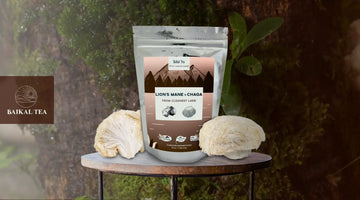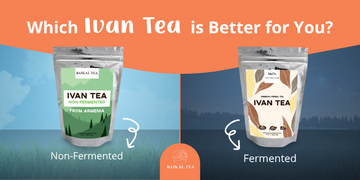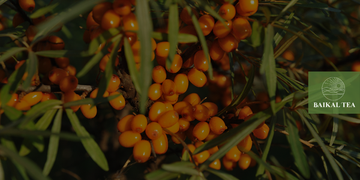Simply mention the words tea and coffee, and it’s the age-old belief - both work to stimulate the body through the effects of caffeine. But what about Chaga tea caffeine? Just by looking at it, you can more or less guess that it’s just about the same as regular tea… or is it?
Surprisingly enough, Chaga Tea actually contains zero caffeine! But that doesn’t take away its reputation as an energy booster, as it's famously known for its stimulating effects. So, how exactly does that work? In this article, we’ll be breaking down all you need to know about Chaga tea, its individual contents, and how this miracle drink can bring new breakthroughs to your health.
Get to Know Chaga

From its origins in Siberia, this sturdy mushroom is built to withstand the cold climates of this region. Besides, it also thrives in other parts of the world, particularly in the Northern regions of US, Canada and more.
In the modern world, as more individuals turn towards natural remedies and herbal solutions, Chaga's significance only seems to grow. The Chaga mushroom, scientifically known as Inonotus obliquus, holds a special place in the world of natural remedies and traditional medicine. This unique fungus, predominantly found on birch trees in colder climates like Siberia, Northern Europe, and Canada, is often referred to as the "Diamond of the Forest." This title doesn't just pertain to its rarity or value but also speaks to the myriad health benefits it is believed to offer.
Historically, Chaga has deep roots in various cultures. Traditional Chinese medicine, known for its extensive herbal catalog and holistic healing practices, has recognized and utilized Chaga's potential benefits for centuries. Simultaneously, tribes in Siberia have leaned on this medicinal mushroom, valuing it as a critical component in their natural remedies portfolio.

Harvesting Chaga is a meticulous process that requires both skill and knowledge. Harvesters, often experienced and deeply in tune with the forest's rhythm, journey into the dense woodlands. They search for Chaga's distinctive appearance: a hard, charcoal-like exterior which stands out against the pale bark of birch trees. This exterior is not just a protective layer but a treasure trove of nutrients.
Once these fungi are collected, an essential step follows: drying. Proper drying ensures that Chaga retains its rich nutrient profile, which includes antioxidants, beta-glucans, and other beneficial compounds. Post drying, Chaga can be ground into a fine powder, which then serves as a base for Chaga tea – a brew that's been enjoyed for its purported health benefits. Additionally, the ground Chaga can be incorporated into various herbal mixtures, enhancing their nutrient value and adding a unique flavor profile.
Decoding Caffeine: More than Just a Stimulant

Caffeine, a naturally occurring stimulant, is primarily discovered in specific plants, seeds, and fruits. Sought after for its stimulant properties, it has become a staple in many beverages, including coffee, soft drinks and of course, tea.
Research has proven the health benefits of caffeine, when consumed in moderation. One study showed it has protective effects for cognition, improving concentration levels, mood and body performance. On top of that, it has also been said to be a potential deterrent against certain types of illnesses like diabetes, heart ailments and Parkinson’s disease.

Let’s make a quick comparison between coffee and tea. Generally, it’s a known fact that tea contains less caffeine than coffee. One cup of tea has about half the amount of caffeine that you would find in coffee. A study even compared the effects of tea caffeine and that of coffee.
What was interesting was that two groups of people consumed the same quantity of coffee and tea, respectively, but the results were contrastingly different. Those who drank only tea showed as much alertness levels and performance as the coffee-drinkers, without losing out on sleep! Which goes on to our next order of business, which might make you think twice when you reach out to grab that cup of dark roast.
Why is Too Much Caffeine Bad for You?

Alas, caffeine does have its dark side as well. While it can boost metabolism and enhance physical performance, it may also raise heart rate and blood pressure temporarily. Regular consumption can cause dependence, and sudden cessation can lead to withdrawal symptoms.
Additionally, caffeine acts as a diuretic, increasing urine production, can enhance stomach acid production potentially causing digestive discomfort, and may interfere with sleep if consumed close to bedtime. Although moderate caffeine intake is typically safe and potentially beneficial, excessive consumption can lead to side effects like insomnia and restlessness.
Debunking the Myth: Does Chaga Tea Have Caffeine?

The answer to this question is no. Which begs another question - why should you start swapping to this caffeine-less Chaga tea? There are a few reasons that you should consider before you decide what beverage to start your day with.
- An All-Natural Stimulant
Unlike regular tea or coffee, Chaga tea does not rely on caffeine to provide an energy boost. Instead, it's packed with nutrients and antioxidants that can naturally enhance your vitality and alertness. This means you can enjoy the benefits of a pick-me-up without the potential downsides of caffeine, like jitters or crashes.
- Cheers to Better Sleep
Since Chaga tea is caffeine-free, it doesn't interfere with your sleep cycle. People sensitive to caffeine often experience disrupted sleep or insomnia when they consume caffeine-containing beverages later in the day. We owe this anti-fatigue quality to the Inonotus obliquus polysaccharide (IOPS) in Chaga mushrooms. Research has uncovered this property that is bestowed to Chaga via IOPS, which reduces tiredness and improves sleep. With Chaga tea, you can savor a warm cup in the evening without worrying about tossing and turning at night.
- Energy to Last the Day
Although it doesn't contain caffeine, many individuals report that Chaga tea gives them consistent energy throughout the day. This is due to its rich nutrient profile that supports overall well-being and stamina. Instead of the highs and lows that sometimes accompany caffeinated drinks, Chaga tea might offer a more consistent energy flow.
While Chaga tea might not have the immediate kick of a strong coffee or tea, its long-term benefits and absence of caffeine make it an enticing option for many looking for a healthier, more balanced energy source.
How is Chaga Tea Made?
Now that we’ve covered the basics, it’s time to move onto more technical stuff. Chaga and tea, it might sound as simple as putting those two ingredients together, but truth be told the process is a dedicated one.
To achieve that perfect balance between the earthy taste of mushrooms and natural tea essence, it takes expertise and commitment. The Chaga Mushroom, commonly found growing on wounded or dying white birch trees, thrives in the temperate forests of Northern Europe, Canada, the United States, and various parts of the Northern Hemisphere. This unique fungi not only serves as a natural balm for the tree's wounds but also acts as a shield against invading microorganisms.
Foragers journey deep into the woods to harvest this rare jewel, and once collected, the Chaga are dried to the core. Finally Chaga tea comes into the picture when the dried Chaga are ground into fine powder, or are just included in the herbal tea blend.
But Where Does the Energy Come From in Chaga Tea?

So, if Chaga tea is meant to stand in as a substitute for caffeine, where does the energy come from? The answer lies in the medley of antioxidants and vitamins that are abundant in this wonderful mushroom.
Macronutrients and vitamins are an underrated asset to your health, but maybe you haven’t had a real showstopper to prove to you yet. Cue Chaga tea, the ultimate antioxidant powerhouse that eliminates harmful chemicals, also known as free radicals, from your body. It contains an abundance of vitamins like vitamin D and macronutrients like polysaccharides play an important role in augmenting energy levels by getting rid of toxic radicals. In turn, this leaves your body feeling refreshed and rejuvenated all the way through.
Recommended Brands to Try

The world of Chaga tea is just as diverse as any classic tea, with thousands of brands offering their own take on this herbal remedy. To save your time searching through all those, we’re highlighting a few teas worth investing in.
Every Chaga tea variant has its unique properties. But this Chaga tea from Baikal is sourced from the fertile soil surrounding Lake Baikal in Russia. Their tea is rich with age-old vitality and essential nutrients that will unfurl when you steep each tea bag. It has garnered much love for its distinct, smooth texture that almost feels like a warm hug in the mouth.
If you’re craving a more authentic, natural taste of Chaga tea, forget the tea bags! That’s what Baikal Tea has come up with in their signature Loose Ground Chaga. Just add a spoon of Baikal’s loose ground Chaga tea to a cup of warm water and taste the difference yourself.
A Final Note on Chaga Tea

So it’s official, Chaga’s secret behind its energy-boosting prowess isn’t caffeine. That rejuvenating burst you experience is due to its vibrant array of nutrients and adaptogenic qualities.
It's easy to get swept away by the allure of Chaga and label it as the next wonder potion. However, as with all things, balance is essential. Embracing Chaga as a part of a well-rounded diet and an overall wholesome lifestyle is the ideal approach. As you delve into the world of Chaga, it's vital to stay attuned to your body's signals. Every individual's experience can be unique. If something feels amiss or you're just keen on understanding more, don't hesitate to seek out a professional opinion.
Nevertheless, it’s safe to say that the benefits of Chaga tea definitely outweigh a caffeine-dependent lifestyle. So if you’re looking to change up your routine for the better, we hope that ‘Chaga tea’ will be the first thing that pops up in your mind.





